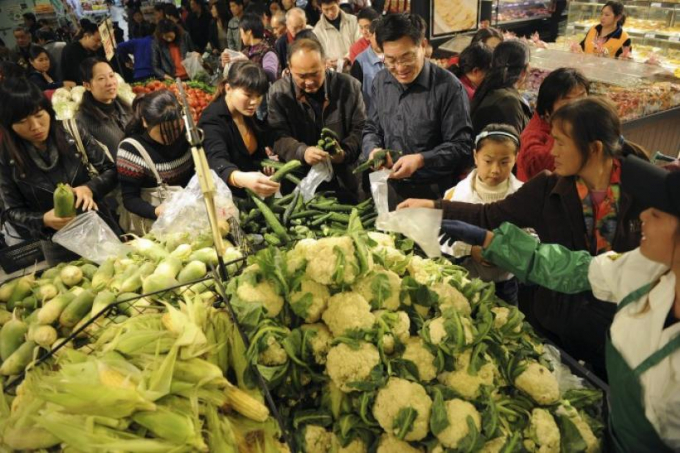May 28, 2025 | 19:57 GMT +7
May 28, 2025 | 19:57 GMT +7
Hotline: 0913.378.918
May 28, 2025 | 19:57 GMT +7
Hotline: 0913.378.918

China has made food security a priority for the world’s second-biggest economy, an effort to meet the soaring demand that’s pushed imports of corn, soybeans and wheat to record levels, making Beijing increasingly vulnerable to trade tensions and supply shocks. Photo: Getty
USDA confirmed a flash sale Monday that totaled 1.020 million metric tons of corn by China. 680,000 tons of the purchase are for old crop, with the remaining 340,000 for delivery in the 2022/2023 marketing year.
The purchase was on the heels of China’s largest corn purchase since May of 2021 last week, a purchase that totaled 1.084 million tons. Brian Grete, editor of Pro Farmer, thinks it’s a trend that will continue.
“China's in a hoarding mode right now,” says Grete. “Food security is one of their top priorities, if not their top priority, and you just took a chunk out with Ukraine. Ukraine had become a major supplier of corn to China. And I think that we will see China in for more corn.”
Corn prices climbed again this week, with CBOT corn hitting over $7.83 per bushel, the highest since 2012.
Even with prices increasing, Grete doesn’t expect China’s interest to just stop at corn, as other commodities impacted by the crisis in Ukraine could also spur more buying.
“We'll probably also see China buying other commodities. What commodities they have at home, especially wheat, which is about half of the global supply, they aren't going to push onto the world market. They're going to keep those themselves. China's historically a hoarder. And amid the inflating prices around the world, the tightening supplies, they are hoarding even more right now.”
Just a month ago, China’s Minister of Agriculture and Rural Affairs signaled China’s wheat crop could be the “worst in history.” The news caused concerns about what impact that could have on already tightening supplies. However, this week, the country signaled the crop is considerably better than communicated a few weeks prior. And as the world’s largest wheat consumer sends mixed signals, it’s also creating confusion on why China changed its wheat storyline so quickly, as today, analysts expect China to come to the market for more wheat.
“I think they could come in for the wheat market. There's been some talk about that for awhile,” says Mark Gold of StoneX Group. “Right now, you look at some of the things that have been going on, Egypt is looking for wheat, it looks like it may come out of the Black Sea area, they'll take the risk of shipping it. We know India's got a bumper crop, 111 million metric tons, and they intend to ramp up exports dramatically.”
Gold says considering wheat is grown around the world, it may be too early to think a global shortage of wheat is inevitable.
“We harvest wheat somewhere around the world every month, so I'm just not sure wheat is in as dire situation as maybe corn and soybeans are,” Gold adds. “Let's temper that by saying if you look at Texas, Oklahoma and Kansas, Montana, their crops are in bad shape, and not getting much better.”
Reports in portions of Texas this week indicate severe winds and high heat may have finished off the winter wheat crop that was still standing. Growers say most of the dryland wheat in the area has already been written off by crop adjusters, as drought takes its toll on winter wheat across the Plains. Up until this point, some of the irrigated wheat was barely holding on. However, the weather this week caused the wheat to already show signs of loss, which could further reduce U.S. wheat supplies.
If China continues to come to the market to buy, demand for grains isn’t a concern, specifically with corn. In fact, Gold thinks the rationing of demand needs to take place.
“We don't need to find demand in any of the grains right now. We need to find a way to ration what we've got out here. The demand is there. It continues. Is there going to be as stout as some would like to hope? I don't think so. But when I look at it, we've got good margins on feeding livestock. We've got good margins just about all across the board. So, I don't see that price has rationed any demand out here…. We don't need more demand with prices where they are right now.”
(AgriWeb)

(VAN) Vikas Rambal has quietly built a $5 billion business empire in manufacturing, property and solar, and catapulted onto the Rich List.

(VAN) Available cropland now at less than five percent, according to latest geospatial assessment from FAO and UNOSAT.

(VAN) Alt Carbon has raised $12 million in a seed round as it plans to scale its carbon dioxide removal work in the South Asian nation.

(VAN) Attempts to bring down the price of the Japanese staple have had little effect amid a cost-of-living crisis.

(VAN) Fourth most important food crop in peril as Latin America and Caribbean suffer from slow-onset climate disaster.

(VAN) Shifting market dynamics and the noise around new legislation has propelled Trouw Nutrition’s research around early life nutrition in poultry. Today, it continues to be a key area of research.

(VAN) India is concerned about its food security and the livelihoods of its farmers if more US food imports are allowed.